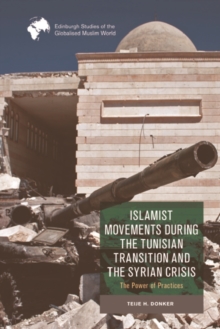
Islamist Movements during the Tunisian Transition and Syrian Crisis : The Power of Practices EPUB
by Teije H Donker
Part of the Edinburgh Studies of the Globalised Muslim World series
EPUB
Description
Explores the distinct practices of post-2011 Islamist movements in Syria and Tunisia
- Provides a detailed empirical investigation of the emergence, transformation and decline of an Islamist movement during the Tunisian transition and Syrian crisis (2011-21)
- Focuses on what people did not what they thought to assess the impact of Islamist movements on collective activism
- Tilts research on Islamism from a preoccupation on ideology to one focused on practices
- Introduces the notion of distinct practices for comparative analyses of social movements across episodes of social and political conflict
Islamism haunted post-2011 movements for democratisation in the Arab world. Political liberalisations opened space for Islamist movements from the Muslim Brotherhood and Salafist to Jihadists and the Islamic State and seemed to threaten the liberal character of reforms. Going against this popular perception of Islamism as defined by an illiberal ideology, this book provides a ground breaking analysis of the concrete practices of Islamist movements to assess their impact on post-2011 activism. It traces the establishment of Islamic schools, charity organisations, courts and political parties; articulations of Islamic collective identities, enforcement of public norms and provision of public services during the Tunisian transition and the Syrian crisis (2011-2021). Teije H. Donker argues that Islamists are caught in an enduring struggle to define their own impact by rendering religion distinct among the practices that make up social and political conflict. This results in a phenomenon that defies easy categorisations and morphs with social and political developments in the region.
Information
-
Download - Immediately Available
- Format:EPUB
- Pages:296 pages
- Publisher:Edinburgh University Press
- Publication Date:06/02/2024
- Category:
- ISBN:9781399506212
Other Formats
- PDF from £72.25
Information
-
Download - Immediately Available
- Format:EPUB
- Pages:296 pages
- Publisher:Edinburgh University Press
- Publication Date:06/02/2024
- Category:
- ISBN:9781399506212










